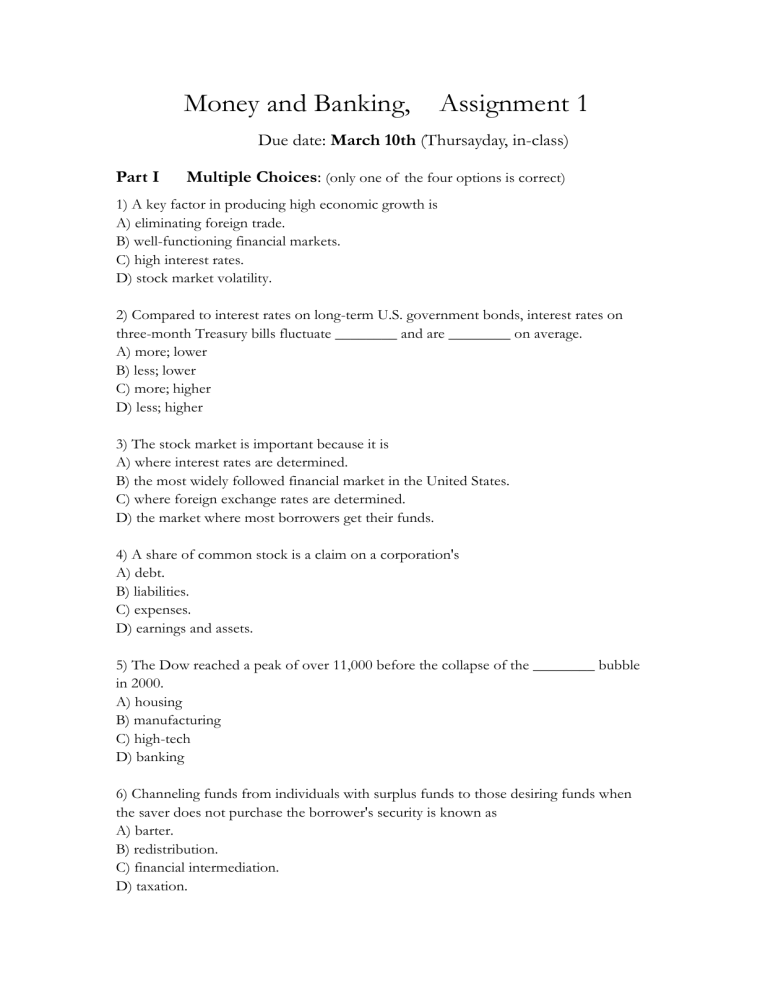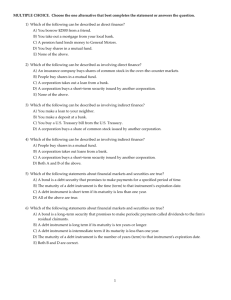Money and Banking Assignment 1: Financial Markets & Policy
advertisement

Money and Banking, Assignment 1 Due date: March 10th (Thursayday, in-class) Part I Multiple Choices: (only one of the four options is correct) 1) A key factor in producing high economic growth is A) eliminating foreign trade. B) well-functioning financial markets. C) high interest rates. D) stock market volatility. 2) Compared to interest rates on long-term U.S. government bonds, interest rates on three-month Treasury bills fluctuate ________ and are ________ on average. A) more; lower B) less; lower C) more; higher D) less; higher 3) The stock market is important because it is A) where interest rates are determined. B) the most widely followed financial market in the United States. C) where foreign exchange rates are determined. D) the market where most borrowers get their funds. 4) A share of common stock is a claim on a corporation's A) debt. B) liabilities. C) expenses. D) earnings and assets. 5) The Dow reached a peak of over 11,000 before the collapse of the ________ bubble in 2000. A) housing B) manufacturing C) high-tech D) banking 6) Channeling funds from individuals with surplus funds to those desiring funds when the saver does not purchase the borrower's security is known as A) barter. B) redistribution. C) financial intermediation. D) taxation. 7) Money is defined as A) bills of exchange. B) anything that is generally accepted in payment for goods and services or in the repayment of debt. C) a risk-free repository of spending power. D) the unrecognized liability of governments. 8) Evidence from the United States and other foreign countries indicates that A) there is a strong positive association between inflation and growth rate of money over long periods of time. B) there is little support for the assertion that "inflation is always and everywhere a monetary phenomenon." C) countries with low monetary growth rates tend to experience higher rates of inflation, all else being constant. D) money growth is clearly unrelated to inflation. 9) Which of the following statements uses the economists' definition of money? A) I plan to earn a lot of money over the summer. B) Betsy is rich—she has a lot of money. C) I hope that I have enough money to buy my lunch today. D) The job with New Company gave me the opportunity to earn more money. 10) Well-functioning financial market A) cause inflation B) eliminate the need for indirect finance C) cause financial crises D) produce an efficient allocation of capital. 11) Which of the following can be described as involving direct finance? A) A corporation issues new shares of stock. B) People buy shares in a mutual fund. C) A pension fund manager buys a short-term corporate security in the secondary market. D) An insurance company buys shares of common stock in the over-the-counter markets. 12) Which of the following can be described as involving indirect finance? A) You make a loan to your neighbor. B) A corporation buys a share of common stock issued by another corporation in the primary market. C) You buy a U.S. Treasury bill from the U.S. Treasury. D) You make a deposit at a bank. 13) Which of the following statements about the characteristics of debt and equity is false? A) They can both be long-term financial instruments. B) They can both be short-term financial instruments. C) They both involve a claim on the issuer's income. D) They both enable a corporation to raise funds. 14) Equity holders are a corporation's ________. That means the corporation must pay all of its debt holders before it pays its equity holders. A) debtors B) brokers C) residual claimants D) underwriters 15) Because these securities are more liquid and generally have smaller price fluctuations, corporations and banks use the ________ securities to earn interest on temporary surplus funds. A) money market B) capital market C) bond market D) stock market Part II 1. 2. Analytical Exercises Question 23 in Chapter 2 of the textbook. (page. 92) Go to the Federal Reserve Bank of St. Louise’ economic research database (FRED, http://research.stlouisfed.org/fred2/). Choose FRED@ Economic Data -> Categories -> International Data -> Countries -> China, and find the National Currency to US Dollar Spot Exchange Rate for China. 1) Use the graph tool on the webpage to provide a graph showing the exchange rate of Renminbi to US Dollar between 1990-01-01 and 2014-03-01. 2) Your graph should include several sudden and sharp increases of the exchange rate (almost vertical) and several periods that the exchange rate was largely constant. Identify these periods in your graph. 3) Collect information about the history of China’s policy on Renminbi exchange rate determination from various sources (e.g. People’s Bank of China website, Wikipedia, Google or Baidu), and explain those patterns you have identified above.

